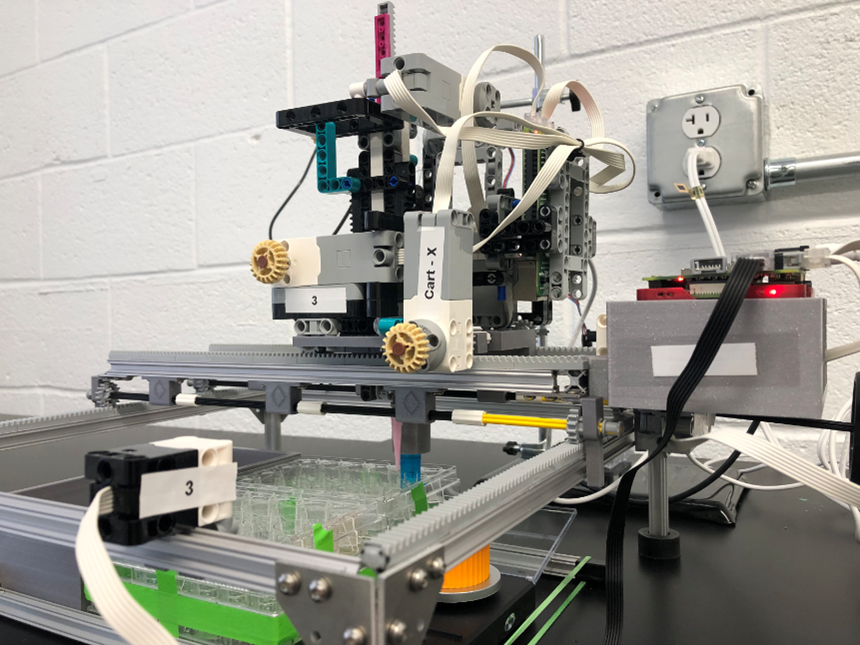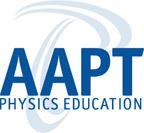- Home
- What We Do
- Laboratory Immersions
- Immersions 2023
- Imm2023Maryland_LEGOLAS
University of Maryland, College Park, MD
LEGOLAS: LEGO-based Low-Cost Autonomous Scientist
Dates: June 19, 2023 to June 21, 2023
Number of setups available: 2
Maximum number of participants: 4
------------------------------------------------------------------------------------------------------------------------------------------
 The next generation of physical science involves robot scientists – autonomous physical science systems capable of experimental design, execution, and analysis in a closed loop. Such systems have shown real-world success for scientific exploration and discovery, including the first discovery of a best-in-class material. To build and use autonomous systems, the next generation workforce requires expertise in diverse areas including ML, measurement science, and decision theory. We present the next generation in science education, LEGOLAS – LEGO-based Low-cost Autonomous Scientist, an easy-to-use platform to teach autonomous physical science skills. The kit has been used over the past 3 years as part of University of Maryland courses, teaching undergraduate and graduate students. For more information about the system, please see (open access): https://link.springer.com/article/10.1557/s43577-022-00430-2
The next generation of physical science involves robot scientists – autonomous physical science systems capable of experimental design, execution, and analysis in a closed loop. Such systems have shown real-world success for scientific exploration and discovery, including the first discovery of a best-in-class material. To build and use autonomous systems, the next generation workforce requires expertise in diverse areas including ML, measurement science, and decision theory. We present the next generation in science education, LEGOLAS – LEGO-based Low-cost Autonomous Scientist, an easy-to-use platform to teach autonomous physical science skills. The kit has been used over the past 3 years as part of University of Maryland courses, teaching undergraduate and graduate students. For more information about the system, please see (open access): https://link.springer.com/article/10.1557/s43577-022-00430-2
We will cover the fundamentals of autonomous physical science with a focus on the machine learning used to drive autonomous experiments. This includes the basics of regression, optimal experiment design, and Bayesian analysis. Attendees will then use the learned skills to run autonomous experiments with LEGOLAS.
Regarding safety, the experiments involve food dyes as well as acid and base at the strength of household vinegar and milk of magnesia.
The three-day Immersion consists of 1.5 days of background education and 1.5 days of hands-on experiments.
Day 1: Machine learning fundamentals
Basic Python
High level introduction to machine learning.
Introduction to regression: From linear regression to Gaussian processes.
Introduction to active learning, i.e., the machine learning field of optimal experiment design).
Day 2: Introduction to Autonomous Science and LEGOLAS.
Closed loop autonomous machine learning.
Synthesizing and characterize samples.
Basic autonomous science.
Day 3: Autonomous Experiments exploring relationship between acid/base concentration and pH.
Autonomous experiments assuming minimal prior knowledge.
Autonomous hypothesis determination.
Required:
Participants must bring a laptop. Prior acquaintance with Python will be beneficial. Software carpentry has two lessons (https://software-carpentry.org/lessons/).
Estimated cost for individual LEGOLAS kit: $2,000
Ichiro Takeuchi, UMD
Logan Saar, UMD
Haotong Liang, UMD
A. Gilad Kusne, NIST & UMD
A. Gilad Kusne received his B.S., M.S., and Ph.D. degrees from Carnegie Mellon University. He is a Staff Scientist with the National Institute of Standards and Technology (NIST), Gaithersburg, Maryland, an adjunct professor with the University of Maryland, and a Fellow of the American Physical Society. His research is part of the White House’s Materials Genome Initiative at NIST, a project which aims to accelerate the discovery and optimization of advanced materials. He leads the machine learning team of an international, cross-disciplinary effort building autonomous research systems, with the goal of advancing solid state, soft, and biological materials. For these systems, machine learning performs experiment design, execution (in the lab and in silico), and analysis. For his work, he has been awarded the NIST Bronze Award, the highest NIST award. He is also a founder and organizer of the annual Machine Learning for Materials Research Bootcamp and Workshop—educating next generation and mid-career material scientists in machine learning.
Ichiro Takeuchi is a professor of materials science and engineering and affiliate professor of physics at the University of Maryland. He received his Ph.D. in physics from the University of Maryland in 1996. Prior to joining the University of Maryland faculty, he was a postdoctoral research associate at Lawrence Berkeley National Laboratory, where he helped pioneer the combinatorial materials synthesis strategy. Takeuchi’s research program is focused on combinatorial exploration of novel functional materials, machine learning for materials research, development of elastocaloric materials and systems, and superconducting devices. Since 2009, Takeuchi has also served as the CTO of Maryland Energy & Sensor Technologies, LLC, a start-up dedicated to development of elastocaloric cooling systems. Takeuchi is a fellow of the American Physical Society and the Japan Society of Applied Physics.
Logan Saar is pursuing a M.S. in Materials Science & Engineering department at the University of Maryland. His research focuses on the development of low-cost educational robotics kits and computational platforms to teach the fundamentals of autonomous physical science. This field combines aspects of combinatorial engineering, artificial intelligence, and autonomous robotics to accelerate the discovery and optimization of new materials for novel electronic applications.
Haotong Liang is in his 2nd year of the Ph.D. program in the Materials Science and Engineering Dept of the University of Maryland. His research interests are in deep learning, autonomous experimental design, composition phase diagram, and quantum materials. He is experienced in the Linux operating system and computer networking which helps with the hardware-level implementation of autonomous experimentation. His current research focuses on the rapid structural characterization of thin-film materials which is beneficial for phase mapping and crystalline quality control.
Dr. Gilad Kusne. Email: aaron.kusne@nist.gov





